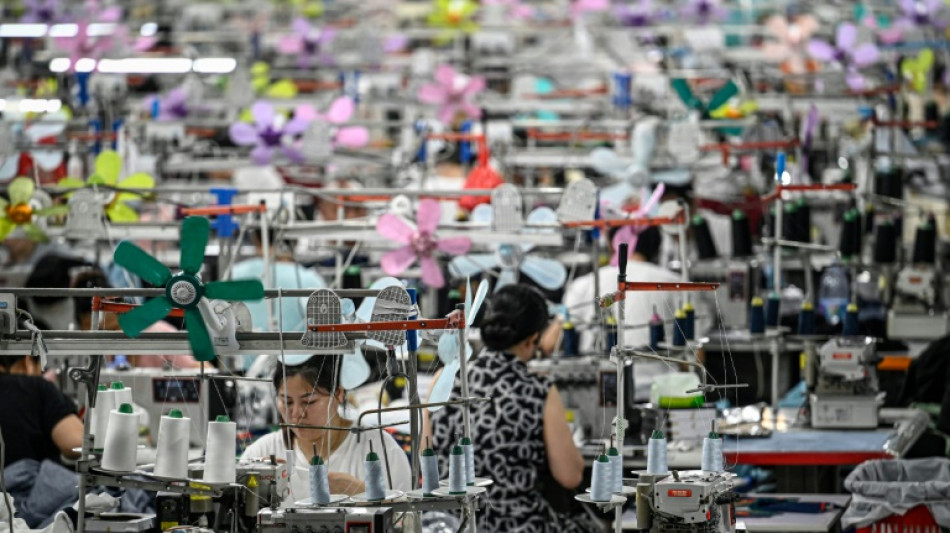
-
 Billionaire-owned Paris FC win promotion and prepare to take on PSG
Billionaire-owned Paris FC win promotion and prepare to take on PSG
-
Teenager Antonelli grabs pole for Miami sprint race

-
 Man City climb to third as De Bruyne sinks Wolves
Man City climb to third as De Bruyne sinks Wolves
-
Mercedes' Wolff backs Hamilton to come good with Ferrari

-
 'Devastated' Prince Harry says no UK return but seeks reconciliation
'Devastated' Prince Harry says no UK return but seeks reconciliation
-
Elway agent death likely accidental: report

-
 Turkish Cypriots protest new rule allowing hijab in school
Turkish Cypriots protest new rule allowing hijab in school
-
Germany's AfD dealt blow with right-wing extremist label

-
 Trump NASA budget prioritizes Moon, Mars missions over research
Trump NASA budget prioritizes Moon, Mars missions over research
-
Hard-right romps through UK polls slapping aside main parties
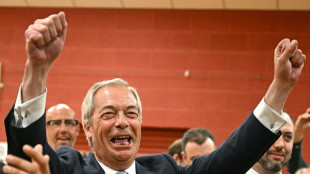
-
 Rangers hire two-time NHL champion Sullivan as coach
Rangers hire two-time NHL champion Sullivan as coach
-
Haaland on bench for Man City as striker returns ahead of schedule

-
 US designates two Haitian gangs as terror groups
US designates two Haitian gangs as terror groups
-
Lower profits at US oil giants amid fall in crude prices

-
 NBA icon Popovich stepping down as Spurs coach after 29 seasons
NBA icon Popovich stepping down as Spurs coach after 29 seasons
-
'Devastated' Prince Harry says no return to UK but seeks royal reconciliation

-
 Grande scratched from Kentucky Derby
Grande scratched from Kentucky Derby
-
Carney vows to transform Canada economy to withstand Trump
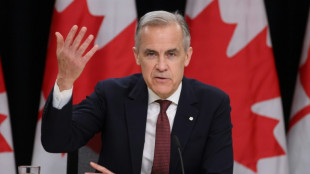
-
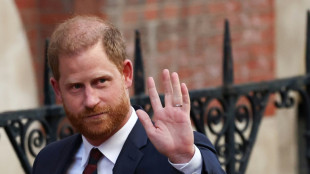 Prince Harry says he would 'love' to reconcile with family
Prince Harry says he would 'love' to reconcile with family
-
Major offshore quake causes tsunami scare in Chile, Argentina
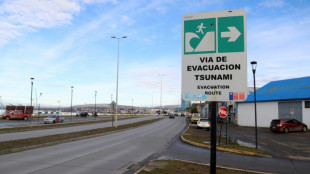
-
 GM cuts shift at Canada plant over 'evolving trade environment'
GM cuts shift at Canada plant over 'evolving trade environment'
-
F1 extends deal to keep Miami GP until 2041

-
 Popovich mixed toughness and spirit to make NBA history
Popovich mixed toughness and spirit to make NBA history
-
US asks judge to break up Google's ad tech business

-
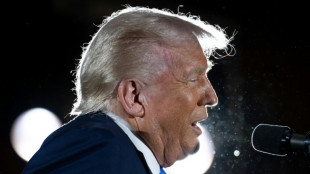 Trump eyes huge 'woke' cuts in budget blueprint
Trump eyes huge 'woke' cuts in budget blueprint
-
Ruud downs Cerundolo to book spot in Madrid Open final

-
 Gregg Popovich stepping down as San Antonio Spurs coach after 29 seasons: team
Gregg Popovich stepping down as San Antonio Spurs coach after 29 seasons: team
-
Guardiola to take break from football when he leaves Man City

-
 Vine escapes to Tour of Romandie 3rd stage win as Baudin keeps lead
Vine escapes to Tour of Romandie 3rd stage win as Baudin keeps lead
-
Olympic 100m medalist Kerley arrested, out of Miami Grand Slam meet

-
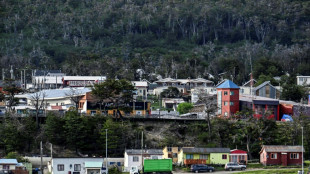 Chile, Argentina order evacuations over post-quake tsunami threat
Chile, Argentina order evacuations over post-quake tsunami threat
-
Arteta 'pain' as Arsenal fall short in Premier League title race

-
 Hard-right romps across UK local elections slapping down main parties
Hard-right romps across UK local elections slapping down main parties
-
US ends duty-free shipping loophole for low-cost goods from China

-
 Renewables sceptic Peter Dutton aims for Australian PM's job
Renewables sceptic Peter Dutton aims for Australian PM's job
-
Australians vote in election swayed by inflation, Trump

-
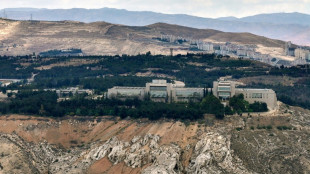 Syria slams Israeli Damascus strike as 'dangerous escalation'
Syria slams Israeli Damascus strike as 'dangerous escalation'
-
Grand Theft Auto VI release postponed to May 2026

-
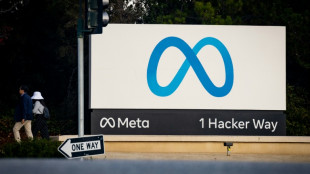 Lawyers probe 'dire' conditions for Meta content moderators in Ghana
Lawyers probe 'dire' conditions for Meta content moderators in Ghana
-
Maresca confident Chelsea can close gap to Liverpool

-
 Watchdog accuses papal contenders of ignoring sex abuse
Watchdog accuses papal contenders of ignoring sex abuse
-
Berlin culture official quits after funding cut backlash

-
 US hiring better than expected despite Trump uncertainty
US hiring better than expected despite Trump uncertainty
-
EU fine: TikTok's latest setback
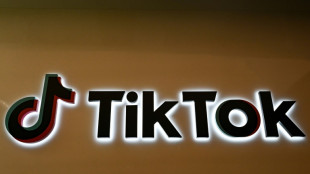
-
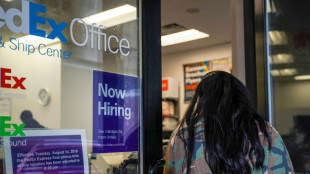 Stocks gain on US jobs data, tariff talks hopes
Stocks gain on US jobs data, tariff talks hopes
-
Barca's Ter Stegen to return from long lay-off for Valladolid trip

-
 US hiring slows less than expected, unemployment unchanged
US hiring slows less than expected, unemployment unchanged
-
Man Utd must 'take risk' and rotate players as they target European glory: Amorim

-
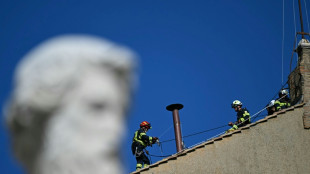 Vatican chimney installed ahead of papal conclave
Vatican chimney installed ahead of papal conclave
-
Toulouse's Ramos to miss Champions Cup semi with injury


How Trump's 'liberation day' tariffs will impact China
US President Donald Trump has slapped punishing new tariffs on imports of Chinese goods, deepening a trade war between the world's two largest economies.
Beijing has vowed countermeasures in response and warned the new tariffs will cripple global supply chains -- and Washington's own interests.
AFP looks at how so-called "liberation day" tariffs -- which bring levies on Chinese goods to 54 percent -- will hit China:
- Why is China so vulnerable? -
China's export-driven economy is particularly sensitive to vicissitudes in international trade.
Trade between it and the United States, the world's two largest economies, is vast.
According to Beijing's customs data, sales of Chinese goods to the United States last year totalled more than $500 billion -- 16.4 percent of the country's exports.
US duties also threaten to harm China's fragile economic recovery as it struggles with a long-running debt crisis in the property sector and persistently low consumption -- a downturn Beijing had sought to slow with broad fiscal stimulus last year.
But an intensified trade war will likely mean China cannot peg its hopes for strong economic growth this year on its exports, which reached record highs in 2024.
"The US tariffs on Chinese imports announced so far this year could fully negate the lift from the fiscal stimulus measures announced so far," Frederic Neumann, Chief Asia Economist at HSBC, told AFP.
And while he said the impact on export competition may be slightly mitigated by the fact that all countries are hit by the levies, he stressed "the drag on Chinese growth is nevertheless significant".
- What impact will the new tariffs have? -
The new tariffs slap 10 percent levies on imports from around the world.
But China -- whose yawning trade deficit with the United States of $270.4 billion has long drawn Trump's ire -- faces much higher levies.
The latest salvo adds 34 percent to a 20 percent rate imposed last month, bringing the total additional tariffs on imports from the Asian economic powerhouse imposed by the Trump administration to 54 percent.
The tariffs come into effect in stages -- a ten percentage point bump on Thursday, followed by the full levy on April 9.
China is also under sector-specific tariffs on steel, aluminium and car imports.
Analysts expect the new levies to take a significant chunk out of the country's GDP, which Beijing's leadership hope will grow five percent this year.
Julian Evans-Pritchard, Head of China Economics at Capital Economics, said in a note he said he expected the economic hit to range from 0.5 percent to one percent of GDP.
Likely to be hit hardest are China's top exports to the United States -- the country is the dominant supplier of goods from electronics and electrical machinery to textiles and clothing, according to the Peterson Institute of International Economics.
But analysts also warn that because of the crucial role Chinese goods play in supplying US firms, the tariffs may also have major knock-on effects.
"US imports from China are dominated by capital goods and industrial materials instead of consumer goods," Gene Ma, Head of China Research at the Institute of International Finance, told AFP.
"The tariff will hurt US manufacturers as well as consumers."
"This trade war not only has a destructive impact on China but also on the global trade system," Chen Wenling, Chief Economist at the China Center for International Economic Exchanges in Beijing, said.
- How might Beijing respond? -
Beijing has yet to specify what exactly its "countermeasures" will involve.
But the retaliation could see Beijing hike pre-existing tariffs imposed in response to previous measures.
"China's countermeasures should be reasonable, beneficial and measured," Mei Xinyu, an economist at the state-affiliated Chinese Academy of International Trade and Economic Cooperation in Beijing, told AFP.
"They need to be strong and precise, while also avoiding turning the countermeasures into a decoupling of China and the United States," Mei added.
China last month slapped tariffs of 15 percent in imports of coal and liquefied natural gas from the United States. Crude oil, agricultural machinery, big-engined vehicles and pickup trucks also face 10 percent duties.
Analysts say those moves are designed to hit Trump's support base -- those in America's rural heartlands that voted him into office last year.
Beijing has called for dialogue to resolve the dispute, but any deal will take time.
"There are still chances for the two parties to resume talks in the following months," Betty Wang at Oxford Economics told AFP.
"But historical experience suggests that tariffs are typically quick to rise and slow to fall."
M.Betschart--VB

